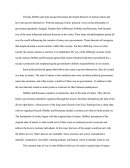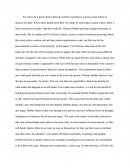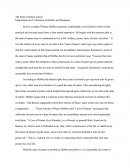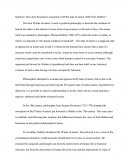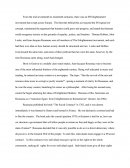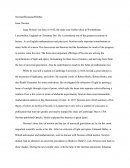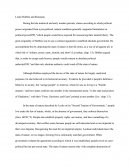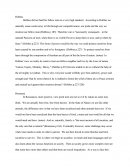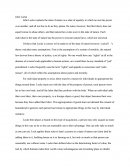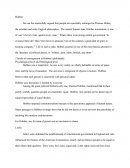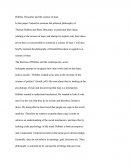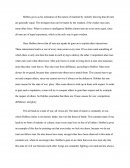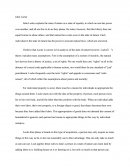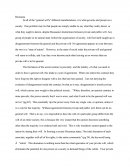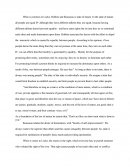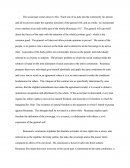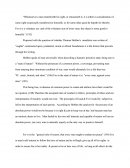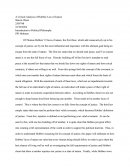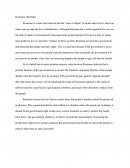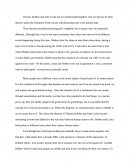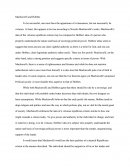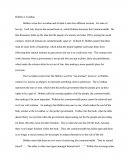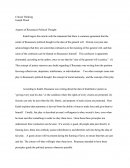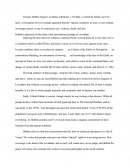Hobbes Rousseau essays and research papers
Last update: May 22, 2015-
Hobbes and Rousseau
Thomas Hobbes and Jean-Jacques Rousseau developed theories on human nature and how men govern themselves. With the passing of time, political views on the philosophy of government gradually changed. Despite their differences, Hobbes and Rousseau, both became two of the most influential political theorists in the world. Their ideas and philosophies spread all over the world influencing the creation of many new governments. These theorists all recognize that people develop a social contract within their
Rating:Essay Length: 2,144 Words / 9 PagesSubmitted: September 26, 2010 -
Hobbes Vs. Rousseau
For one to be a good citizen, there are certain expectations a person must follow to achieve this goal. While many people have their own ideas of what makes a good citizen, there is little consensus to exactly what this would be. Thomas Hobbes and Jean-Jacques Rousseau, in their books The Leviathan and The Social Contract, create a system of political governing where the citizen plays a certain role and has certain expectations to carry
Rating:Essay Length: 2,287 Words / 10 PagesSubmitted: November 13, 2010 -
The State of Nature and Its Implications for Civilization in Hobbes and Rousseau
The State of Nature and its Implications for Civilization in Hobbes and Rousseau In his Leviathan Thomas Hobbes expresses a philosophy of civilization which is both practical and just and stems from a clear moral imperative. He begins with the assertion that in the state of nature man is condemned to live a life "solitary, poore, nasty, brutish, and short." It is in the interest of every man to rise above this "state of nature"
Rating:Essay Length: 1,662 Words / 7 PagesSubmitted: November 20, 2010 -
How Does Rousseau's Conception of Ð''the State of Nature' Differ from Hobbes'?
Question: How does Rousseau's conception of Ð''the state of nature' differ from Hobbes'? The term Ð''state of nature' is used in political philosophy to describe the condition of human life either in the absence of some form of government, or the lack of laws. The notion itself was initiated by philosopher Thomas Hobbes (1588-1679) within his book Leviathan, in which it is depicted as "the natural condition of mankind" . The state of nature is
Rating:Essay Length: 1,591 Words / 7 PagesSubmitted: November 23, 2010 -
Rousseau, Locke, and Hobbes
From the mid seventeenth to nineteenth centuries, there was an Ð''Enlightenment' movement that swept across Europe. The theorists behind this act rejected the Ð''original sin' concept, maintained the argument that humans could grow and progress, and stated that humans could reorganize society on the grounds of equality, justice, and freedom. Thomas Hobbes, John Locke, and Jean-Jacques Rousseau were all members of The Enlightenment movement, and each had their own idea on how human society should
Rating:Essay Length: 1,238 Words / 5 PagesSubmitted: November 23, 2010 -
Newton/rousseau/hobbes
Newton/Rousseau/Hobbes Isaac Newton Isaac Newton was born in 1642, the same year Galileo died, in Woolsthorpe, Lincolnshire, England on Christmas Day. He is considered one of the greatest scientists in history. As an English mathematician and physicist, Newton made important contributions to many fields of science. His discoveries and theories laid the foundation for much of the progress in science since his time. The three most important offerings of Newton are solving the mystifications of
Rating:Essay Length: 1,833 Words / 8 PagesSubmitted: December 8, 2010 -
Locke Hobbes and Rousseau
Locke Hobbes and Rousseau During the late medieval and early modern periods, claims according to which political power originated from a pre-political, natural condition generally supported limitations on political powerвЂ"which people would have required for renouncing their natural liberty. The great originality of Hobbes was to use a contract argument to establish absolute government. He accomplished this by depicting the state of nature in horrific terms, as a war of all against all, in which
Rating:Essay Length: 428 Words / 2 PagesSubmitted: February 3, 2011 -
Hobbes and Rousseau
Hobbes Hobbes did not hold his fellow man to a very high standard. According to Hobbes we naturally cause controversy in life through our competitiveness, our pride and the way we mistrust our fellow man.(Hobbes p.185) Therefore war is "necessarily consequent... to the naturall Passions of men, when there is no visible Power to keep them in awe, and tye them by feare." (Hobbes p.223) This form of power would be the way we could
Rating:Essay Length: 954 Words / 4 PagesSubmitted: March 6, 2011 -
Locke, Hobbes, Mill, Thoreau
John Locke John Locke explains the state of nature as a state of equality in which no one has power over another, and all are free to do as they please. He notes, however, that this liberty does not equal license to abuse others, and that natural law exists even in the state of nature. Each individual in the state of nature has the power to execute natural laws, which are universal. I believe that
Rating:Essay Length: 1,468 Words / 6 PagesSubmitted: September 1, 2010 -
Hobbes
Hobbes No one has masterfully argued that people are essentially estranged as Thomas Hobes, the mordant and witty English philosopher. The natural human state, Hobbes maintained, is one of war "of every man, against every man." Where there is no strong central government "to overawe them all," then "men have no pleasure, but on the contrary a great deal of grief, in keeping company." Life in such a state, Hobbes asserted in one of the
Rating:Essay Length: 1,298 Words / 6 PagesSubmitted: September 18, 2010 -
Hobbes Descartes and the Science of Man
Hobbes, Descartes and the science of man In this paper I intend to examine the political philosophy of Thomas Hobbes and Rene Descartes, in particular their ideas relating to the science of man, and attempt to explain why their ideas prove that it is not possible to construct a science of man. I will also briefly mention the philosophy of Donald Davidson in regards to a science of man. The theories of Hobbes and the
Rating:Essay Length: 1,406 Words / 6 PagesSubmitted: October 20, 2010 -
Hobbs
Hobbes gives us his estimation of the nature of mankind by initially showing that all men are generally equal. The strongest man can be beaten by the weakest, if the weaker man uses some other force. When it comes to intelligence Hobbes claims men are even more equal, since all men are of equal experience, which is the only way to gain wisdom. Once Hobbes shows that all men are equals he goes on to
Rating:Essay Length: 464 Words / 2 PagesSubmitted: October 20, 2010 -
Locke, Hobbes, Mill, Thoreau
John Locke John Locke explains the state of nature as a state of equality in which no one has power over another, and all are free to do as they please. He notes, however, that this liberty does not equal license to abuse others, and that natural law exists even in the state of nature. Each individual in the state of nature has the power to execute natural laws, which are universal. I believe that
Rating:Essay Length: 1,468 Words / 6 PagesSubmitted: October 21, 2010 -
Rousseau
Rousseau In all of the "general will's" different manifestations, it is what governs and preserves a society. One problem may be that people are simply unable to say what they really desire, or what they ought to desire, despite Rousseau's distinctions between private and public will. Any group of people in its natural state, before the organization of society, will find itself caught up in disagreements between the general and the private will. No agreement
Rating:Essay Length: 750 Words / 3 PagesSubmitted: October 26, 2010 -
Mill, Rousse, Hobbes, Locke
What is common in Locke, Hobbes and Rousseau is state of nature. In the state of nature all people are equal Ð'- although they have different tallents they are equal, because having different tallents doesn't prevent equality - and have same rights but in time they try to command each other and make domination upon them. Hobbes associate this desire with the effort to dispel the insecurity which is caused by equality between people. According
Rating:Essay Length: 2,117 Words / 9 PagesSubmitted: October 30, 2010 -
Rousseau Social Contract
The social pact comes down to this; "Each one of us puts into the community his person and all his powers under the supreme direction of the general will; and as a body, we incorporate every member as an indivisible part of the whole (Rousseau: 61)". The general will can itself direct the forces of the state with the intention of the whole's primary goal - which is the common good. The general will does
Rating:Essay Length: 1,608 Words / 7 PagesSubmitted: October 30, 2010 -
Hobbes' Prudential Oughts
"Whensoever a man transferreth his right, or renounceth it; it is either in consideration of some right reciprocally transferred to himselfe; or for some other good he hopeth for thereby. For it is a voluntary act: and of the voluntary acts of every man, the object is some good to himselfe." (192) Proposed with the question of whether Thomas Hobbes's manifesto was written of "oughts" constructed upon; prudential, moral or ethical foundations it is the
Rating:Essay Length: 840 Words / 4 PagesSubmitted: October 31, 2010 -
A Critical Analysis of Hobbes' Law of Justice
A Critical Analysis of Hobbes' Law of Justice Shawn Olson 2509748 10/10/2004 Introduction to Political Philosophy SW Holtman Of Thomas Hobbes' 19 laws of nature, the first three, which add consecutively up to his concept of justice, are by far the most influential and important, with the ultimate goal being an escape from the state of nature. The first law states that we should seek peace, and if we cannot attain it, to use the
Rating:Essay Length: 5,465 Words / 22 PagesSubmitted: October 31, 2010 -
Analysis Thomas Hobbes's Claim "a State of Nature Is, or Would Be, a State of War of Everyone Against Everyone."
Thomas Hobbes argues that a state of nature will eventually become a state of war of everyone against everyone. According the Hobbes, the main reason behind this change will be the harsh competition over scarce resources caused by the nature of man. Through out this essay Hobbes's reasons will be explained in greater detail. In order to truly understand the logic behind Hobbes's claim, we must first understand his point of view of human nature.
Rating:Essay Length: 1,420 Words / 6 PagesSubmitted: November 2, 2010 -
Rousseau - Bad Idea
Rousseau- Bad Idea Rousseau is a man who believed that the "state of nature" in which man lived is what can make man go mad and live in disharmony. Although Rousseau has a valid argument his view on the state of nature is misconstrued. Rousseau believes that instead of living in a state of nature, man needed to live in "societies" instead. In these societies Rousseau envisioned a government that protected the people and their
Rating:Essay Length: 288 Words / 2 PagesSubmitted: November 2, 2010 -
John Locke Vs. Thomas Hobbes
Thomas Hobbes and John Locke are two political philosophers who are famous for their theories about the formation of the society and discussing man in his natural state. Their theories are both psychologically insightful, but in nature, they are drastically different. Although they lived in the same timeframe, their ideas were derived from different events happening during this time. Hobbes drew his ideas on man from observation, during a time of civil strife in Europe
Rating:Essay Length: 1,237 Words / 5 PagesSubmitted: November 2, 2010 -
Machiavelli and Hobbes
Machiavelli and Hobbes To be successful, one must have the appearance of virtuousness, but not necessarily be virtuous. At least, this appears to be true according to Niccolo Machiavelli's works. Machiavelli's idea of the virtuous republican citizen may be compared to Hobbes' idea of a person who properly understands the nature and basis of sovereign political power. Hobbes' ideas seem to suggest that most anyone can claim rightful authority as there is a belief in
Rating:Essay Length: 1,477 Words / 6 PagesSubmitted: November 3, 2010 -
Hobbes; Leviathan
Hobbes; Leviathan Hobbes wrote the Leviathan and divided it into four different sections. For sake of brevity, I will only discuss the second book in, which Hobbes discusses the Commonwealth. He, like Rousseau, holds up the idea that the people of a society are better off by joining the social contract, which all humans are unintentionally apart of. In Book II, Hobbes asserts that there must be some form of leadership, which holds the people
Rating:Essay Length: 655 Words / 3 PagesSubmitted: November 4, 2010 -
Aspects of Rousseau's Political Thought
Critical Thinking Joseph Wood Aspects of Rousseau's Political Thought Kateb begins this article with the statement that there is common agreement that the center of Rousseau's political thought is the idea of the general will. Almost everyone also acknowledges that they are somewhat confused as to the meaning of this general will, and that some of the confusion can be blamed on Rousseau's himself. This confusion is apparently eliminated, according to the author, once we
Rating:Essay Length: 2,593 Words / 11 PagesSubmitted: November 6, 2010 -
Hobbes's Depiction of This State Is the Most Famous Passage in Leviathan
Thomas Hobbes begins Leviathan with Book 1: Of Man, in which he builds, layer by layer, a foundation for his eventual argument that the "natural condition" of man, or one without sovereign control, is one of continuous war, violence, death, and fear. Hobbes's depiction of this state is the most famous passage in Leviathan: [D]uring the time men live without a common Power to keep them all in awe, they are in a condition which
Rating:Essay Length: 680 Words / 3 PagesSubmitted: November 8, 2010
